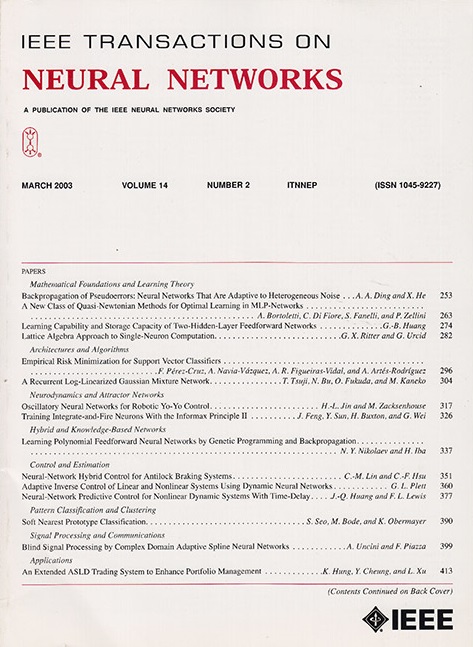多模式批量变化检测。
IF 10.2
1区 计算机科学
Q1 COMPUTER SCIENCE, ARTIFICIAL INTELLIGENCE
IEEE transactions on neural networks and learning systems
Pub Date : 2023-08-15
DOI:10.1109/TNNLS.2023.3294846
引用次数: 0
摘要
我们解决了在一种新的批量和多模式设置中检测分布变化的问题。该设置的特点是平稳条件,其中从训练集中表示的[公式:见文本]中的一组分布中的潜在不同模态中提取批次。现有的变化检测(CD)算法假设存在表征平稳条件的独特的可能多峰分布,并且在分批的多峰环境中表现出低检测能力或对假阳性的较差控制。我们提出了多模态QuantTree(MMQT),这是一种新的CD算法,它使用单个直方图来对分批多模态平稳条件进行建模。在测试过程中,MMQT自动识别哪个模态生成了传入批次,并通过模态特定的统计信息检测变化。我们利用QuantTree的理论特性:1)自动估计训练集中模态的数量,2)推导出保证假阳性控制的原则校准程序。我们的实验表明,MMQT在合成和真实世界的多模式CD问题中实现了高检测能力和对假阳性的准确控制。此外,我们展示了MMQT在流学习应用中的潜力,在流学习中,它被证明可以通过单独监测输入分布来有效地检测概念漂移和新类的出现。本文章由计算机程序翻译,如有差异,请以英文原文为准。
Multimodal Batch-Wise Change Detection
We address the problem of detecting distribution changes in a novel batch-wise and multimodal setup. This setup is characterized by a stationary condition where batches are drawn from potentially different modalities among a set of distributions in
$\mathbb {R}^{d}$
represented in the training set. Existing change detection (CD) algorithms assume that there is a unique—possibly multipeaked—distribution characterizing stationary conditions, and in batch-wise multimodal context exhibit either low detection power or poor control of false positives. We present MultiModal QuantTree (MMQT), a novel CD algorithm that uses a single histogram to model the batch-wise multimodal stationary conditions. During testing, MMQT automatically identifies which modality has generated the incoming batch and detects changes by means of a modality-specific statistic. We leverage the theoretical properties of QuantTree to: 1) automatically estimate the number of modalities in a training set and 2) derive a principled calibration procedure that guarantees false-positive control. Our experiments show that MMQT achieves high detection power and accurate control over false positives in synthetic and real-world multimodal CD problems. Moreover, we show the potential of MMQT in Stream Learning applications, where it proves effective at detecting concept drifts and the emergence of novel classes by solely monitoring the input distribution.
求助全文
通过发布文献求助,成功后即可免费获取论文全文。
去求助
来源期刊

IEEE transactions on neural networks and learning systems
COMPUTER SCIENCE, ARTIFICIAL INTELLIGENCE-COMPUTER SCIENCE, HARDWARE & ARCHITECTURE
CiteScore
23.80
自引率
9.60%
发文量
2102
审稿时长
3-8 weeks
期刊介绍:
The focus of IEEE Transactions on Neural Networks and Learning Systems is to present scholarly articles discussing the theory, design, and applications of neural networks as well as other learning systems. The journal primarily highlights technical and scientific research in this domain.
 求助内容:
求助内容: 应助结果提醒方式:
应助结果提醒方式:


